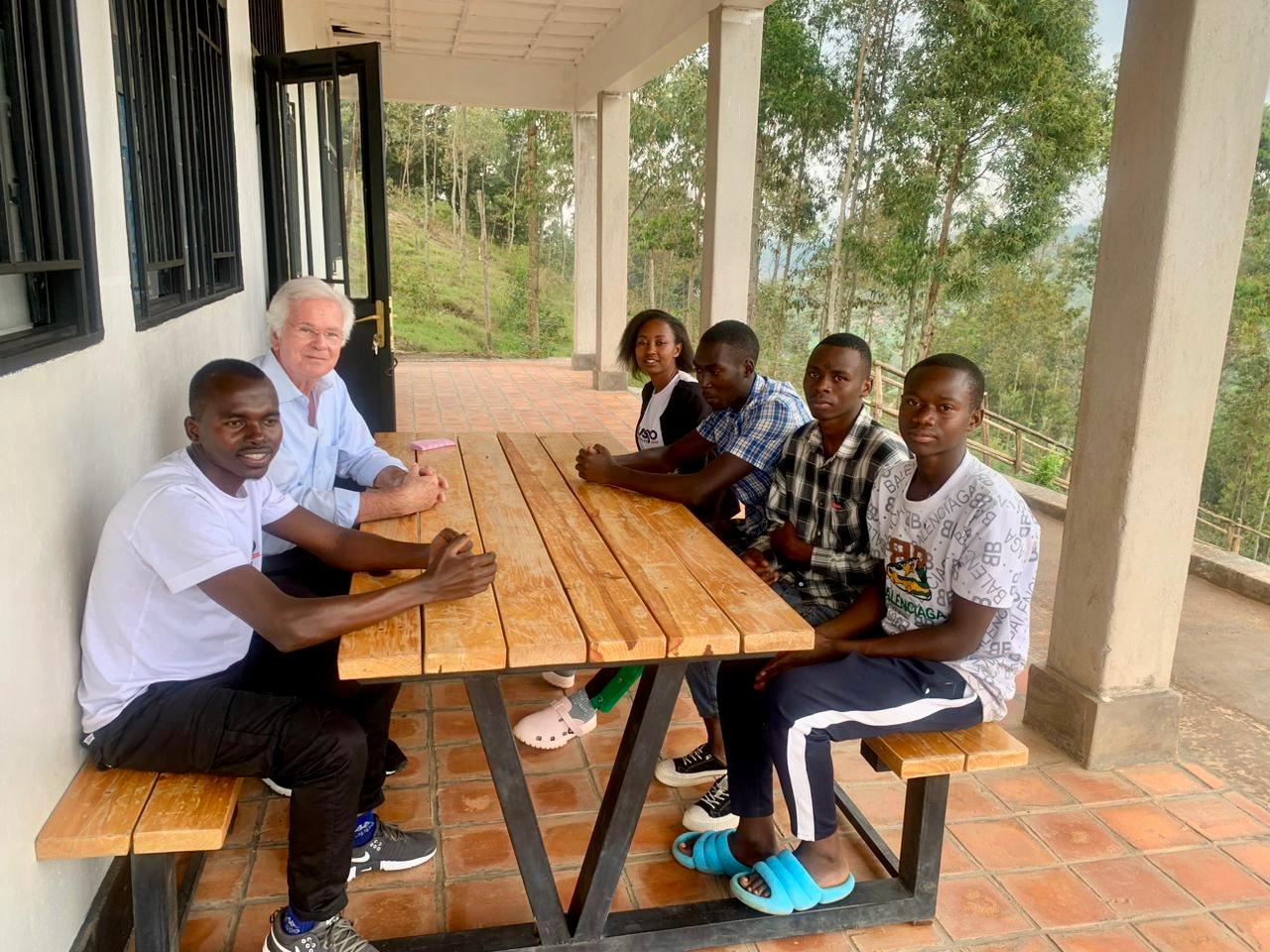My first visit to Dusego in August 2018
When I visited Dusego for the first time in 2018, I walked down the path and entered a world that was unknown to me. Playful kids welcomed me and accompanied me to the group of houses that formed their rural community. For some of them I was the first white man they ever encountered, curiously touching my bleak skin, exploring whether the paint would come off. Their parents lived the same life their grandparents did, as well as their ancestors before. Getting water from the river, in the valley below, taking care of the cows and goats, cultivating the bean plants in the garden in front of the house, and preparing food were day-to-day vital activities. These come to a natural end around 6pm, when the fixed sunset turns the light off in the households without electricity.
For a westerner, spoiled by modernity, this rural life has an attractive charm. The romantic simplicity of living close to nature, far away from the pressure of rat races in polluted cities, while imprisoned by algorithms and social media that undermine our self-efficacy and mental well-being, makes me long for another way of existing. Do the youngsters of Dusego also look at their life in such a way? Tap water saves hours a day on lugging heavy jerry cans up the hill. With solar panels on the roof you can do your homework, read a book, write poems and put your stories on paper even after six in the evening. A computer, tablet and the Internet open windows onto a world you don’t know about or have only dreamed of. It must be wonderful not to have to spend all available time on heavy housework and just be able to play, or practice traditional and break dance with masters. It’s easy for me to say because I had the luxury of coming into contact with all these opportunities for personal development at an early age and being able to circle in a rich environment offering many new experiences.
My second visit to Dusego in November 2024
This week, November 2024, I returned to Dusego. At a distance from the hilltop, I saw the brand-new Development Hub, proudly overlooking the valley. Welcomed by the staff members Agnes, Theophile and Janet in their impeccable Dusego Hub shirts they showed me their new workspace. The central meeting hall with stacked chairs is big enough to accommodate quite a large number of guests. An intimate library offers a quiet room for reading and reflection, inspired by many books and games for all age groups. The staff share a separate space where they can prepare the activities, each in their domain of expertise and interest. A little bit down the hill the toilet facilities are located, easily accessible via a pleasantly designed staircase, that blends into the landscape.
On the porch I meet a group of teenagers who come here every Saturday and prepare with Theophile their upcoming sports performance. Four elegantly dressed young girls took books from the library and read concentrated their colorful stories. Agnes goes through a pile of written texts that another group left for her. In the playground I meet a lady, that could have been my mother. She passes by just to say hello and shares her first English expressions that she has learned here in the Tuesday afternoon group of elder villagers, who come here every week to pick up another language.
Meanwhile, impressive construction work is going on at the back site of the Hub building. Since the opening this year, the hub attracts so many participants of various age groups, that there is a need for a second meeting hall. Some hub activities require lively interaction and deliberation, others demand a quiet environment for writing, drawing and thinking. In the new expansion is also room for a kitchen. Preparing meals together, learning about healthy food and the importance of balanced nutrition will become important community activities.
Marchior is in charge of the new construction work. He invites local people who learn the tricks of the trade from him. He prefers to use materials from the immediate area and applies old building techniques, to which he adds new insights. The result fits in nicely with the environment while the realized functionalities fully support the modern views of the Dusego Community Development Hub.
Dieudonné Gakire is the driving force behind this special initiative in Dusego. When we were walking around here together six years ago, he told me about his dreams of giving something back to the community he was part of during his childhood. With exceptional efforts, he managed to get access to good education in the capital city of Kigali without any resources of his own and later even continued his studies at the Amsterdam University College.
Of course, he looks back on an upbringing in an untouched environment, wandering around with grazing cows and resting under the avocado tree. But the backdrop of the idyllic picture is the unforgiving harshness of an existence that offers little opportunity for development and inhibits getting to know the world that only exists in your dreams. The lack of perspective can lead to a depressing lethargy, if you can’t find a way out. Gakire found an opening. But he chose not to flee his background and birthplace. He returned to his village to give something back to the community of his family and ancestors.
Some personal reflections on an extraordinary initiative
Step by step he creates new opportunities for the young people who dream of another world in the Dusego Community Development Hub. I believe that he does not oppose the current existence in the rural area but adds new perspectives that he himself and many youngsters have sorely missed.
I have great admiration for Gakire’s inexhaustible energy to realize his dreams on his own. He can make others enthusiastic about his ideas and to work with him. He inspires his local staff members by showing them how to shape a modern learning-working environment, in which talent, personal interest and intrinsic motivation form the most important fuel for growth and development. He introduces them to forms of distributed leadership, which do justice to everyone’s expertise and affinity. Although he is undeniably the great predecessor in this special initiative that is taking shape in Dusego, he grants his employees the autonomy and authority to develop activities that fit in with the values that underlie the Development Hub.
And this basic attitude, which is averse to hierarchy and subordination, will also be reflected in the approach of the participants in the activities of the Hub. As soon as they step in, they also acquire ownership of their activities. I think that is one of the attractive aspects of the initiative. You like to come here because there is an atmosphere of unconstrained freedom. And once you have become acquainted with that, you will find it valuable and meaningful, which will also make you feel partly responsible for it. This is not just theory. You could already see it during the festive closing event of the first summer camp. It were the children who invited their parents to come to the Hub. They were proud of what they had achieved in the previous weeks and wanted to show it to their loved ones. They conjured up a performance of self-conscious ownership.
A more convincing proof of the significance of the Dusego Development Hub is hardly possible.
Joseph Kessels
Professor emeritus of Human Resource Development
At the University of Twente and the Open University
The Netherlands



Leave a Reply